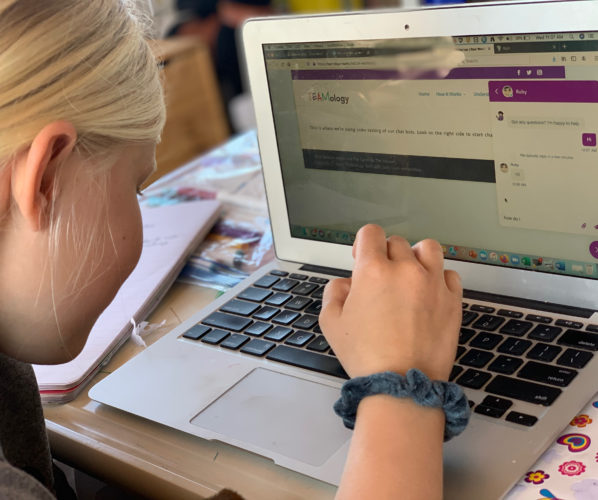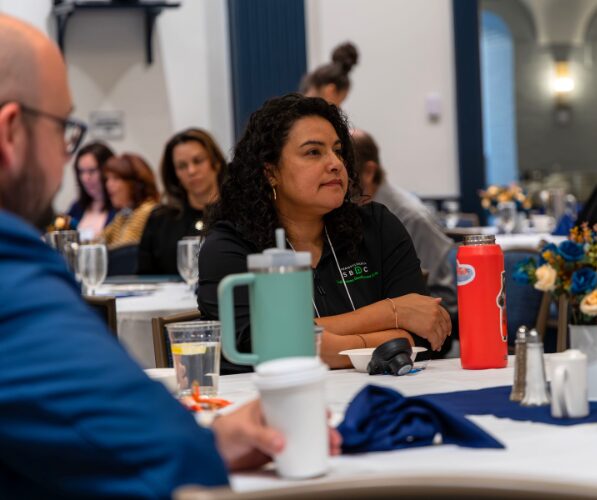Success Story
Penn State Startup TEAMology Incorporates AI into Social Emotional Learning Framework for K-8 Students
Sometimes we forget that school plays a greater role in many students’ lives than simply learning reading, writing, math, and core subjects with subsequent tests and grades. For many students, school is the only place where critical life skills, including their social and emotional abilities, will be cultivated before they become adults and active members of society. Social and emotional wellness, as well as traits like problem solving, resilience, and leadership, are a strong indicator of how well a young student will adjust to their environment and how successful they will be in navigating the future. With the ongoing COVID-19 pandemic, students are experiencing heightened challenges at home and with schoolwork, making these skills more important than ever before.
Penn State startup TEAMology wants to ensure students get the support they need to develop socially and emotionally. Founded in 2006, the ed tech startup’s curriculum simplifies and strengthens social and emotional learning for schools, kids and parents, providing the foundational tools that are necessary for success in life through a curriculum and content teachers can use in the classroom.
TEAMology uses six diverse fictional characters that students learn from digitally. Each character represents an important, interconnected and foundational skill to help students with social and emotional learning; for example, Amelia is TEAMology’s antibullying and acceptance character. Other characters teach foundational skills such as how to affect positive change, helping others, problem solving, leadership, and resiliency.
“In education, there has been a focus on academics and testing to determine success for students,” says Linsey Covert, TEAMology founder and CEO. “But when we don’t take time to focus on social emotional learning (SEL) with kids, it impacts overall health, including physical health. The more time we invest in educating and providing information and coping skills to young kids, the less we see outcomes such as incarceration, substance abuse and school violence later in life.”
In 2019, Covert decided to take the characters a step further to support kids in the moment—not only through prepackaged curriculum. She connected with Penn State Executive Director of Innovation & Nittany AI Alliance Daren Coudriet to discuss incorporating artificial intelligence into TEAMology’s system for schools.
Today, AI is being developed that allows students to have real-time conversations with a bot version of TEAMology characters. The bots are programmed with questions and responses related to that character’s specific skillset that would come up in conversation with students.
“TEAMology currently has a wealth of content to aid in the social emotional learning of students across America,” says Coudriet. “The key challenge is to find a way to cost effectively identify and serve up the right content to benefit students who need it most. For the health of our nation, we need companies like TEAMology to succeed.”
When the pandemic hit, TEAMology not only began providing as much free content as possible to schools to support students, but they also committed to developing the AI technology further.
Over the past year, Covert acquired funding from Ben Franklin Technology PArtners, partnered with the Penn State Edna Bennett Pierce Prevention Research Center to conduct further research, and worked with the Nittany AI team to launch two pilot programs with their Ruby bot, who teaches resiliency.
A pilot program, which had 40-50 kids participating in a Q&A with Ruby, showed 100% of student participants preferred talking to Ruby over talking to a parent, teacher, or counselor.
“This finding speaks to the technology-based method of SEL ‘delivery’ that TEAMology is using,” says Dr. Laura Jana, board certified pediatrician, author, health communicator with adjunct faculty appointment at the Prevention Research Center, and strategic advisor to TEAMology. “And [it] is quite significant in that it supports the idea that children (and parents/teachers) are receptive to using digital technology, in this case related to social-emotional learning. This level of enthusiasm is particularly good news, given the current (and likely continued) dependence on digital delivery platforms — not just because of the pandemic, but also because of the potential for increased accessibility/scalability as compared to in-person equivalent.”
The AI has two components: a data collection screening process, which is a conversational, evidence-based assessment. Students go through a conversation with Ruby about resiliency, and by the end parents and teachers have information about the student’s strengths, growth opportunities, and ways they can help increase the child’s resilience. This screening also indicates whether or not the student would be interested in the second component of the AI, which is a more personalized 1:1 open dialogue experience with Ruby or another bot.
“Given that social-emotional related skills are not as easy to measure, I am very excited about TEAMology’s innovative use of artificial intelligence to enhance its reach and scalability,” says Dr. Jana. “As a basic principle of AI, the more children who interact with Ruby (and the more descriptive and language-rich data the bot acquires related to resiliency through these interactions), the more effective the bot becomes.”
TEAMology hasn’t used the two components together yet, but full development for the screening process launched in late September of 2020 and testing will start before the end of this school year.
TEAMology has also partnered with public media company WQED, home of Mister Rogers. WQED is getting ready to launch puppets of the startup’s characters with production pieces that work alongside TEAMology’s curriculum and content.
The ed tech startup has been a major beneficiary of the entrepreneurial ecosystem surrounding Penn State. TEAMology has received assistance from the Office of Technology Management to license its intellectual property, was selected for Ben Franklin’s 10-week startup accelerator program TechCelerator @State College and won $10,000 in the TechCelerator final pitch competition. In 2016, Ben Franklin invested $75,000 into TEAMology to support the startup’s growth. The startup also participated in the inaugural Invent Penn State Venture & IP Conference – earning second place in the Tech Tournament and winning a $25,000 award based on the strength of its business concept and product.
“I am super appreciative of that network – it has been extremely valuable to get us this far,” Covert said. “I think the work that’s done within a university is really important – research is critical. The impact to the world is through commercialization, the ability to scale it and get it into the hands of, for our purposes, educators and kids. Our work could not have reached those people by staying in the university. It’s important to get these tools out into the world and make a positive impact.”






